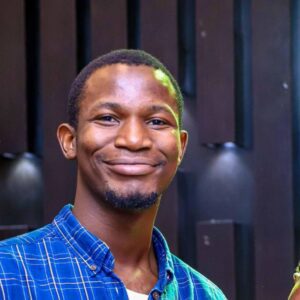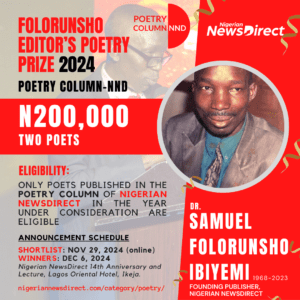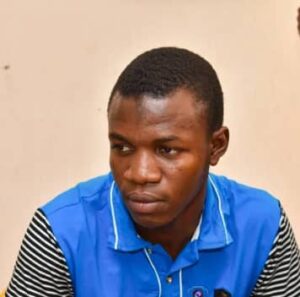
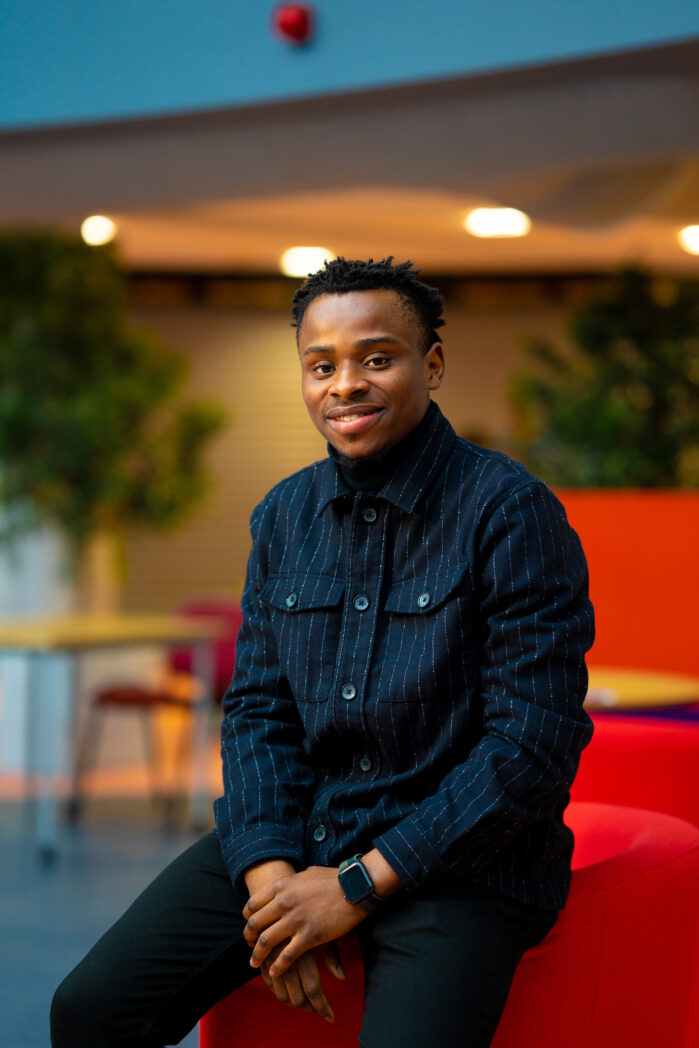

The beauty of Nigerian art is its uniqueness — Rotimi, Founder BGT
…Says investing in talent isn’t about immediate returns, but shaping the future
By Flourish Joshua
In June, Flourish Joshua caught up with Artistic Director, and the Founder of Bowen’s Got Talent, Rotimi Olorunfemi, to discuss the importance of art as a great tool for storytelling. They also explored the role of art directors as critical propellers of art movements, the necessity of archiving for preserving communal memory, and the reforming of the Nigerian aesthetic. The Winner of Black Excellence Award in the UK also shared his plans on starting a talent show for people with disabilities.
Unlike most students admitted into Tertiary Institutions to bag their first degree, you founded Bowen’s Got Talent in 2014, a platform for the discovery and exposure of raw but sleeping talents, which has gone on to become a platform for ten years now. Rotimi, this has not only proven brilliance but leadership skill. How did you successfully balance academics with the initiative? If any, what were your challenges, and how did you sail through?
Well, balancing academics with founding and running Bowen’s Got Talent was definitely a challenge, but it was totally worth it. When I launched the initiative in 2014, I knew it would take a lot of dedication, especially since it was my final year. But I felt a strong need to create a platform for undiscovered talents. The arts have always been close to my heart, and I realised early on that a lot of students had incredible skills that needed to be showcased.
Time management was crucial. I had to be disciplined with my schedule, ensuring that I carved out time for my academic responsibilities while also giving enough attention to Bowen’s Got Talent. My love for both academia and the arts kept me grounded. I would often dedicate evenings and weekends to planning, organising auditions, communicating with vendors, while weekdays were focused on my studies. I also surrounded myself with a strong team—people who shared my passion for the arts and were willing to support the vision. Without them, BGT wouldn’t have come to life.
Delegating responsibilities and building a sense of ownership within the team allowed the initiative to thrive even when I needed to focus on schoolwork. The biggest challenge was finding the balance between these two worlds. There were moments when I had to make difficult choices, like prioritising my dissertation over event rehearsals or missing out on certain social activities to get things done. But through it all, I learned how to be adaptable and resilient. One thing that really helped me sail through was the belief that both academics and the initiative could coexist harmoniously.
Whenever I felt overwhelmed, I reminded myself why I started Bowen’s Got Talent in the first place—to give a voice to the talented yet often overlooked creatives around me. That passion fuelled me during tough times. I also made a point to stay organised—creating to-do lists, prioritising tasks, and learning when to step back and take a breather. With each challenge came growth, and I’m proud to say that Bowen’s Got Talent has continued to evolve over the last decade. The platform has created opportunities for students to express themselves creatively, and seeing them flourish has made every sacrifice worth it. Also, with support from the Bowen Baptist Students’ Fellowship – the umbrella body representing students, and the Bowen University Management.
Looking back, the entire experience taught me not just leadership and management but also the importance of passion and purpose. Those were the pillars that kept me grounded as I balanced academics with this initiative.
Any thoughts on creating a platform off the shores of Tertiary Institutions for talents to thrive and be seen?
Absolutely! I think creating a platform outside the boundaries of tertiary institutions is essential. While schools are great for discovering talents, the world outside offers even more diverse opportunities for people to shine. Talent doesn’t stop developing once you leave university, so having a platform that reaches beyond campus life would give more people—especially those who didn’t have the chance to be seen in school—the opportunity to showcase their skills.
I have been committed and supportive to the creation of platforms for promoting talents in visual arts, dance, poetry, spoken words and music. As I believe talent development doesn’t start and end in school.
It’s also important because it connects creatives with real-world experiences and a wider audience. The industry is competitive, and talents need exposure to professional networks, potential mentors, and even global platforms. By expanding beyond universities, you allow people from all walks of life to come together, share ideas, and collaborate in ways that wouldn’t be possible within the confines of a school setting.
I think it’s about creating a bridge between passion and professional opportunities, which could really make a difference in how talents grow and thrive after graduation.
You were the artistic director for an arts exhibition held on the 29 February 2024 in the United Kingdom, where you emphasised on the importance of bridging the gap between the University of Bradford and local communities through the use of art and artworks. Reflecting on the power of storytelling through art, you said, “people don’t know you until they know your story… Through art, we can connect and understand each other better.” As an art enthusiast yourself, how are you telling your story and making your identity less ambiguous?
As an art enthusiast, I’ve always believed that storytelling through art is one of the most powerful ways to express who you are and where you come from. For me, it’s not about sticking to one specific medium. It’s about blending all the things I’m passionate about—whether it’s music, visual art, or initiatives like Bowen’s Got Talent. Each of these outlets allows me to reveal different parts of my identity and connect with others on a deeper level.
I use art to explore and express my roots, experiences, and personal journey. It’s not always about creating something literal. It’s about translating emotions, values, and the cultural influences that shape me into something tangible. A great example was the event I directed in the UK, where I focused on how art can bridge different worlds. Through that event, I wanted to show how art connects people from different backgrounds, helping them share their stories in ways that go beyond words.
Collaboration is also a key part of my storytelling. Whether I’m working with other creatives or guiding young talents, I’m always learning from those around me. Every project or partnership adds another layer to my own story, making my identity clearer through the connections I build. Art, for me, is a reflection of how we see the world and interact with it. It helps me bring my story to life in a way that invites others to understand who I am.
I’ve also pioneered and supported cultural events that celebrate artistic expressions from diverse backgrounds, including my African heritage. These events have allowed me to share my culture with a wider audience, showing how art connects us through shared experiences. It’s important to me that my personal journey and cultural roots are reflected in the work I do, and these events are a way to make that happen. I have even featured in a movie by Kunle Afolayan, Citation – a movie that raised awareness against sexual harassment geared toward ladies in tertiary institutions. This further shows who I am and what I stand for or against.
Beyond that, I tell my story through writing, painting, and even how I dress. Writing lets me share my thoughts and values with others, while painting allows me to express emotions and ideas that words can’t always capture. My style is another form of self-expression, rooted in my culture and heritage. Through all these forms of art, I’m constantly telling my story and making my identity less ambiguous, helping others see the real me.
As a student at Bowen University, Nigeria, you launched a talent discovery movement and later led various initiatives like art exhibitions, workshops, and cultural events in the United Kingdom. Your efforts earned you the Black Excellence Award in the UK, amongst several awards, recognising your significant impact on the arts and culture scene as an individual of Nigerian and African descent. With such achievements, what drives you? What is the ultimate vision or dream you’re pursuing?
To be very candid, while awards are great, that isn’t my focus. What I’m chasing is a vision where art and culture can be powerful tools for bridging gaps, both culturally and creatively. I want to create spaces where talent, particularly from underrepresented communities, can thrive and be seen on a global stage. Whether it’s through talent discovery initiatives like the one I started at Bowen University or through exhibitions and cultural events, my goal is to build platforms that give a voice to creatives whose stories and perspectives deserve to be heard.
As someone of Nigerian and African descent, I’m deeply passionate about showcasing the richness and diversity of African art and culture. There’s so much untapped talent in our communities, and I want to ensure that these voices are not just recognised but celebrated internationally. Winning the Black Excellence Award in the UK reinforced this purpose for me—to keep pushing boundaries and elevating African narratives in global arts and culture.
The dream is also personal. I want to inspire the next generation of artists and creators to believe in their own potential and embrace their identities. By building bridges between cultures through art, I hope to foster a deeper understanding of the stories that shape us all.
Ultimately, I’m chasing a future where African creatives aren’t just part of the conversation—they’re leading it.
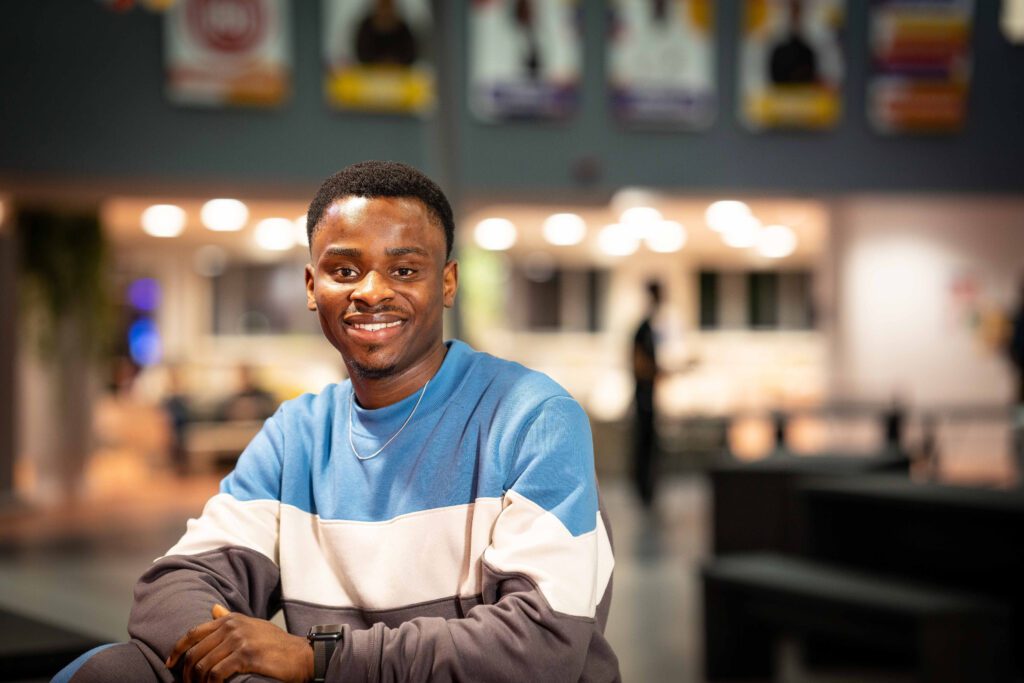
As an aesthetic curator, what Nigerian artist, writer, poet, musician has most influenced your vision?
Hmmmm, it’s hard to pick just one influence because Nigeria has such a rich pool of talented artists. But if I had to choose, I’d say Chinua Achebe has been especially impactful. His storytelling, especially in Things Fall Apart, helped me understand how powerful narratives can be in connecting culture, history, and identity. He’s able to merge tradition with modernity while addressing critical social issues. That inspires me to approach my work with a similar depth and authenticity.
Wole Soyinka is another artist whose influence has been profound. He’s so bold about tackling political and social issues through literature and drama. It’s shaped how I view art as a tool for challenging the status quo. Soyinka’s skill in blending African traditions, folklore, and contemporary themes has taught me the importance of balancing the old with the new—something I strive to reflect in the art I curate. His unapologetic voice and intellectual rigour push me to ensure the art I showcase carries weight and ignites conversations about identity, culture, and societal change.
In the visual arts, Njideka Akunyili Crosby’s work has been particularly inspiring to me. She’s able to seamlessly fuse Nigerian and Western influences in her art. It showcases the beauty of cultural hybridity, a concept that I aim to highlight in my own curations. She captures the complexity of identity in a globalised world, and that’s something I connect with strongly.
Musically, Asa’s influence stands out. Her soulful sound, deeply rooted in African traditions yet appealing globally, reinforces the importance of authenticity in artistic expression. She’s shown me the value of staying true to your cultural identity while still reaching a broader audience. Fela Kuti, with his fearless embrace of African identity and his fusion of traditional sounds with modern themes, has also shaped my understanding of art as a tool for change, not just beauty.
These artists, through their different mediums, have all played a role in shaping my curatorial vision. They inspire me to celebrate African culture while encouraging dialogue between tradition and contemporary global art.
What would you say to organisations, institutions, and successful business individuals regarding investing in promising talents and fostering a healthy society for talents to thrive?
Well, I’d tell organisations, institutions, and successful business leaders that investing in promising talent is like investing in the future. Talented individuals are the ones who come up with new ideas and drive innovation. By supporting them, you’re not just helping them succeed—you’re contributing to the future of industries, communities, and society as a whole.
Investing in talent isn’t just about throwing money at them. It’s about creating an environment where they can grow, take risks, and develop their skills. By offering resources, mentorship, and opportunities, you’re fostering a culture where talent can flourish. And that leads to long-term progress and positive societal change.
It’s not just about the individual either. When talented people succeed, they inspire and uplift others. It’s like a ripple effect that benefits entire communities. This cycle of support and growth leads to more innovation and a healthier, more inclusive society.
So, investing in talent isn’t just about immediate returns—it’s about shaping the future. By supporting creative minds and promising individuals, businesses and organisations play a key role in building a better, more dynamic world for everyone.
What do you presume the future of art and talent management in Nigeria would be, in five years… ten years?
I’m really excited about the future of Nigerian art. We’ve got so much talent here, and it’s amazing to see it growing. The next few years are going to be a really exciting time for our arts scene. With more support and platforms for young artists, we’re going to see a lot of new and innovative work coming out.
Technology is going to be a game-changer too. Digital tools are making it easier for artists to share their work and connect with people all over the world. I can see a future where Nigerian art is celebrated globally. People will be flocking to see our amazing artists and their work.
In ten years, I hope we’ll have a stronger support system in place. This means more programs to help artists develop both their skills and their business savvy. We need to make sure our artists have the tools they need to succeed. I can see Nigeria becoming a real cultural powerhouse, with artists recognized worldwide and people coming from all over to experience our amazing culture.
It’s going to take a lot of work from everyone involved, but I believe that with the right investment and support, the future of art and talent management in Nigeria is incredibly bright. We have the potential to be a global leader in the arts, and I’m excited to see what the future holds.
There is a pattern of the good work done by artists, poets, writers forgotten by the next generation, unless they are classed, or have Western affiliations. As a curator/art director, what do you think is the solution to the generational amnesia/disconnection that plagues the Nigerian talent scene?
Honestly, it’s a real shame that so many amazing Nigerian artists get forgotten. It’s like losing a piece of our history. I’m a huge lover of history, my friends know that about me. They always leave me behind when we visit museums, (breaks into laughter). Frankly, we need to do a better job of preserving their work and making sure the next generation knows about them.
One way to do this is to create a digital archive of their work. That way, people can easily access and learn about them. We can also include their stories and philosophies to give people a better understanding of the context behind their art.
Another idea is to teach about Nigerian art in schools. That way, young people will grow up with a deep appreciation for our cultural heritage. They’ll learn about our history and the amazing artists who have come before them.
We can also organise events and exhibitions to showcase the work of forgotten artists. This will help to raise awareness and spark interest. It’s a great way to introduce people to these artists and their work.
Digital platforms are also really important. We can use them to share the work of these artists with a wider audience. This will help to preserve their legacy and make sure their art is accessible to people all over the world.
Finally, collaborating with international organisations can help us get recognition for Nigerian artists on a global scale. By partnering with museums and galleries around the world, we can introduce people to our amazing art and culture.
By doing all these things, we can make sure that our artistic heritage is never forgotten and that future generations can learn from and be inspired by the amazing work of Nigerian artists.
The Western world has its cubists, romantics, surrealists, imagists, impressionists, abstract expressionists, language poets etc. All of these movements were an inevitable artistic response to the times. As a talent scout, so to speak, what do you think epitomises the Nigerian artistic zeitgeist? What is the work to be done to escape mere generational classifications? How do we also avoid an overt Westernisation of the Nigerian artistic vision?
Nigerian art is a really cool mix of old and new. It’s got this unique style that’s all its own. You can see the influence of our rich cultural heritage, but it’s also got a modern twist that makes it fresh and exciting.
We need to support artists who are trying new things and taking risks. That’s how we’ll keep the art scene vibrant and innovative. We need to encourage them to experiment, to push the boundaries, and to create something truly original.
It’s also important to celebrate what makes Nigerian art special. We shouldn’t try to force it to be like Western art. The beauty of Nigerian art is in its uniqueness. It tells stories that are distinctly Nigerian and reflects our culture in a way that no other art can.
Overall, we want to create a vibrant and diverse art scene that’s both rooted in our traditions and looking towards the future. By supporting artists, fostering creativity, and celebrating the authenticity of Nigerian art, we can ensure that our artistic heritage continues to thrive and evolve.
What book are you currently reading? Any ongoing projects you’d like people to know about?
Right now, I’m really into The Five Dysfunctions of a Team by Patrick Lencioni. I chose this book because I’m setting up my own organisation, The Rotimi Olorunfemi Initiative. I wanted to learn more about how to build a strong and effective team.
We’ve got a big event coming up in November called “Stand Out.” It’s going to be awesome! We’ll have some amazing speakers from various fields, including the arts, inspiring young people to reach for the stars.
I’m also working on a talent show for people with disabilities. I think they’re incredibly talented, but they often don’t get the recognition they deserve.
Beyond that, I’m involved with a few other projects in Nigeria and here in the UK. I’m particularly excited about Bradford 2025 and Bowen’s Got Talent. I’m working on projects to make Bradford a cultural hub and help the next season of Bowen’s Got Talent be even bigger and better.
I’m really focused on building strong relationships and making a difference. I’m also working on improving myself as a leader and as a person. I’m constantly learning and growing, and I’m excited to see what the future holds.
If you are on any album, what’s your favourite track? What’s your favourite line from a song you’ve listened to?
At the moment, I’m not on any particular album so to speak, however, If I were on an album, I’d probably pick a song with a really strong message that connects with people on a deep level. Something like Fela Kuti’s ‘Water No Get Enemy’ really resonates with me. It’s a powerful anthem about resilience and our essential roles in the world. It encourages me to remain valuable where I find myself, it is only then that I cannot be overlooked. The song’s message is timeless and relevant to the challenges we face today.
Another song I love is ‘We Are the World.’ The line ‘We are the world, we are the children’ is so powerful. It’s a reminder that we’re all connected and that we have a responsibility to work together to make the world a better place. The song’s message of unity and hope is particularly inspiring in today’s divisive climate.
Bob Marley’s ‘Redemption Song’ has this amazing line, ‘Emancipate yourself from mental slavery.’ It’s a powerful call to self-determination and personal empowerment. The song’s message is particularly relevant in a world where we’re often bombarded with negative messages and told that we can’t achieve our dreams.
And finally, there’s ‘Fire on the Mountain’ by Asa. The line ‘One day the river will overflow’ is a warning about the dangers of ignoring problems. It’s a reminder that we need to take action now to address the challenges facing our planet and our communities.
These songs inspire me because they’re about important issues and they have powerful messages that can change people’s lives. They remind me that we all have a role to play in making the world a better place.
ABOUT ROTIMI OLORUNFEMI
Rotimi Olorunfemi is a passionate and visionary Nigerian Visual Artist and Artistic Director, with a proven track record of fostering cultural enrichment and artistic expression. With over a decade of experience, he has played a pivotal role in founding and nurturing artistic communities, developing and promoting artistic talents, mentoring young artists, organising impactful cultural events, and creating works that inspire social change. Recognised for outstanding contributions to the arts, he is committed to promoting diversity, sustainability, and innovation in the global arts landscape.

